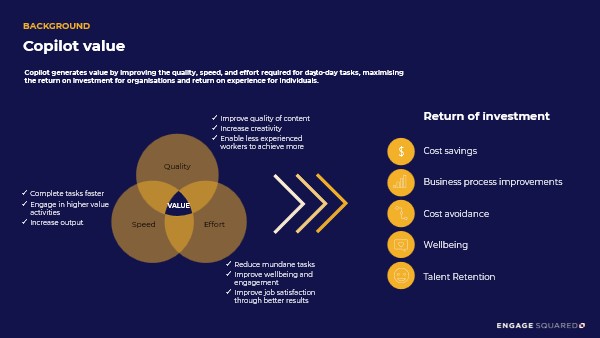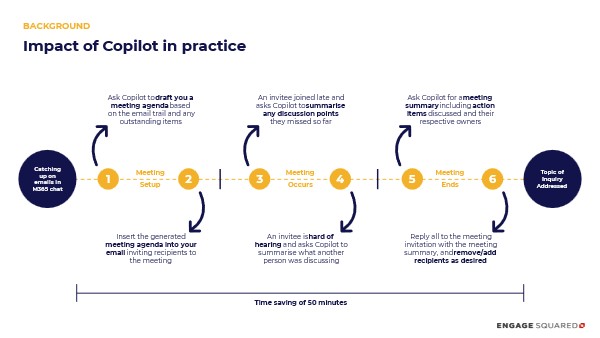
Digging deep to improve employee efficiency: Exploring the benefits of Copilot at global mining company
Our client is one of the world’s largest mining firms, operating in over 35 countries, with ~50,000 employees across Australia, North America, and Africa.
Client
Withheld
Industry
Mining
Organisation Size
50,000+
Country
Australia, North America, and Africa
Technologies
Copilot for Microsoft 365
Context
Challenge
Engage Squared was challenged with creating a business case for Copilot which accurately quantified the impact and value of the Copilot pilot, as well as the opportunity for Copilot expansion across our client’s organisation, with specific reference to observed and potential ROI.
We were also tasked with providing a recommendation for a Copilot expansion, based on Pilot usage levels, assessment of pilot adoption support, qualitative information captured in focus groups and our own experience. A key focus of this recommendation was how to ensure adoption would be achieved at scale in order to realise the projected benefits.
Our approach
Our Transformation and Change practice determined a holistic approach which divided project targets into two phases:
Phase one: Benefits analysis
The aim for this phase was to generate a user-centric understanding and evaluation of the current state of Copilot across our client’s organisation, and what benefits were being realised by licensed users. To ensure a reliable and valid assessment, we focused on three key pillars to ensure our outcomes were grounded in users’ experiences.
- Quantitative Data Gathering – We leveraged Microsoft Viva Insights to extract all Copilot Telemetry data to allow us to analyse just how much each distinctive Copilot actions were being used. To provide insight into where Copilot was generating the most value, we also layered in organisational data to understand what areas and seniority were using it most.
- Qualitative Data Gathering – Copilot user sentiment is imperative to understanding the success and maturity of Copilot adoption and identifying where Copilot can provide unique benefit to certain role types via certain processes or tasks. We conducted several focus groups with different business unit workers, and several 1:1 interview with a blend of executive and knowledge workers.
- Empirical Data Analysis – We then conducted several analyses using both the quantitative and qualitative data, and Microsoft Work Tend Index benchmark data pertaining to average time savings per typical work task. From these analyses, we were able to calculate how much time Copilot had saved users, the adoption rates of Copilot throughout the EAP, and a comprehensive financial impact assessment including total cost of ownerships (TCOs) across several user attribute comparisons (e.g., Business unit, seniority, and location).

Phase two: Recommendations for Copilot license expansion
After completing the initial data collection and analysis, we proceeded to create strategies for broadening Copilot license usage across our client’s organisation, aiming to boost ROI and enhance the user experience.
We analysed our client’s EAP’s change and adoption strategy to identify how it interacted with our initial findings. This process yielded a detailed set of strengths and areas for improvement, informing a recommendations roadmap that built on successful aspects and adjusted the less effective ones.
This method led to a well-founded and customized roadmap designed to improve change and adoption in the context of license expansion efforts, with an expansion plan that factored in adoption by design, not as an afterthought.

Results
Working closely with our client’s Copilot EAP adoption lead, there were high expectations of the impact Copilot had made during the EAP specifically towards efficiencies to everyday tasks and employee experience.
Our findings were included in a comprehensive business case displaying this impact across these key focus areas over 6 months:
Everyday task efficiencies
- 2,849 hours were saved in Microsoft Teams using Copilot through automatic meeting summaries and using M365 Copilot Chat to quickly locate information and files.
- 584 hours were saved in Microsoft Outlook using Copilot through generating automatic email summaries and email drafts.
- 404 hours were saved in Microsoft Word using Copilot through generating document drafts and automatically rewriting document text to fit different purposes.
- Copilot license ROI was significant, with the cost of a single license yielding a 6.3x ROI found from these everyday task efficiencies.
Employee experience
- 83% of Copilot users said – they improved the quality of their work output
- 84% of Copilot users said – they spent less mental effort on mundane or repetitive tasks
- 88% of Copilot users said – they could complete tasks faster
- 90% of Copilot users said – they were able to focus on more important work
- 94% of Copilot users said – they spent less time searching for information
The principal goal of this engagement was the provision of a comprehensive business case for Copilot license expansion across our client’s organisation. Engage Squared is proud to have accomplished this goal, delivering an extensive synthesis of rigorous empirical data gathering and analysis in pursuit of empowering our client to make an informed decision regarding Copilot license expansion.
This business case included:
Empirical Findings – Through our data gathering and analysis, we enabled the customer to understand what positive Copilot impacts had occurred, where they had occurred, and why they had occurred – illustrating crucial information required to make an informed decision regarding license expansion.
Tailored Recommendations – Copilot had made a significant positive impact across the organisation. The question then became how do we manage the increase of our Copilot license pool to ensure this positive impact is maintained and improved upon throughout expansion? We applied our expertise in adoption and change management to the findings of the Copilot benefit analysis and generated a four-pillared expansion roadmap in pursuit of this goal:
- Copilot Governance Model – Appropriate platform governance which ensures Copilot reaches all employees, rigid information governance, and feature updates as Copilot evolves.
- Change Management Approach – Ensuring the maintenance and improvement of observed Copilot ROI through a user-centric approach, data driven support for low-adopters, and easily digestible training videos.
- Continuation of Benefit Analysis – As Copilot licenses expand across the organisation, it is imperative to continue to monitor its usage and adoption, improve the accuracy of ROI estimates, and sample valuable insights from Copilot users about their experiences.
- High Value Use-Case Framework – To facilitate the increase of ROI throughout license expansion, the promotion of Copilot use-cases which save the most time and research into new use-cases is recommended.


